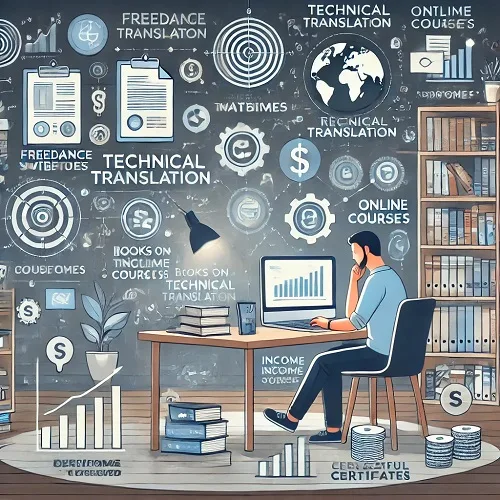Technical Translation: Earn Money with Specialized Language Skills

The demand for technical translators is increasing as businesses and organizations expand globally. Technical translation involves converting documents and content in specialized fields such as engineering, IT, healthcare, and legal industries. This article explores the opportunities, skills required, and steps to become a successful technical translator.
Understanding Technical Translation
Technical translation is the process of translating documents and content that are specific to particular industries. These documents often contain jargon and terminology that require not only language proficiency but also a deep understanding of the subject matter. For instance, translating a user manual for a medical device requires knowledge of medical terms and the device’s functionality.
The role of a technical translator is crucial in ensuring accurate communication across different languages. Misinterpretations can lead to serious consequences, especially in fields like healthcare and engineering. Therefore, precision and attention to detail are paramount in technical translation.
Skills Required for Technical Translation
Becoming a technical translator requires a combination of language skills and industry-specific knowledge. Here are the key skills needed:
- Proficiency in at least two languages, with a strong command of technical terminology in both.
- Understanding of the industry for which you are translating. This might require a background in the field or significant research and learning.
- Attention to detail to ensure accuracy in translation.
- Ability to use translation tools and software that can aid in maintaining consistency and efficiency.
Developing these skills often involves continuous education and practice. Many technical translators also specialize in specific fields to build expertise and credibility.
Finding Work as a Technical Translator
There are several avenues to find work as a technical translator. Here are a few strategies:
- Freelancing platforms: Websites like Upwork, Freelancer, and ProZ offer opportunities to connect with clients seeking technical translation services.
- Translation agencies: Working with agencies can provide a steady flow of projects and help build your portfolio.
- Direct clients: Establishing relationships with companies in your field of expertise can lead to regular work.
Networking with professionals in the translation industry and attending relevant conferences can also open up job opportunities. Building a strong online presence with a professional website and profiles on social media can attract potential clients.
Setting Your Rates as a Technical Translator
Setting competitive rates is essential for attracting clients while ensuring fair compensation for your work. Rates can vary based on factors such as the complexity of the content, the length of the document, and the deadline. It’s important to research industry standards and adjust your rates accordingly.
Many technical translators charge per word, per hour, or per project. Providing clients with detailed quotes that outline the scope of work and associated costs can help manage expectations and avoid misunderstandings.

Using Technology in Technical Translation
Technology plays a significant role in technical translation. Translation tools and software such as CAT (Computer-Assisted Translation) tools can improve efficiency and consistency. These tools store previously translated terms and phrases, which can be reused in future projects.
Machine translation tools, while not always perfect, can assist in translating large volumes of text quickly. However, human oversight is necessary to ensure accuracy and contextual relevance. Staying updated with the latest translation technologies can give you a competitive edge in the market.
Challenges in Technical Translation
Technical translation comes with its set of challenges. One of the primary challenges is staying updated with industry-specific terminology and developments. This requires continuous learning and professional development.
Another challenge is managing tight deadlines while ensuring high-quality translations. Effective time management and organizational skills are crucial to handle multiple projects simultaneously. Additionally, dealing with complex and technical content can be mentally demanding, requiring focus and dedication.
Technical translation is a rewarding career that offers numerous opportunities for those with the right skills and dedication. By understanding the industry, honing your translation skills, and leveraging technology, you can build a successful career as a technical translator. The demand for accurate and reliable technical translations is only set to grow, making it a viable and lucrative profession.
